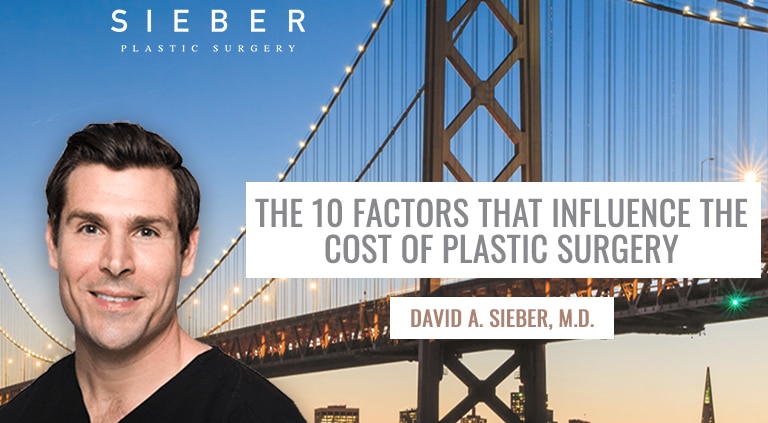Cost of Plastic Surgery: 10 Factors That Influence Price
Historically, plastic surgery has been viewed as a cosmetic procedure that’s only available for the ultra-wealthy. And in some ways, this reputation has been earned; many plastic surgery procedures in the bay area aren’t covered by basic health insurance policies, so patients must pay their providers directly and in full. Additionally, plastic surgeries are complicated and demanding procedures that can only be performed by trained, experienced professionals, with high-quality equipment.
That said, in recent years, even the highest-end, best-executed cosmetic surgery procedures have become less expensive and more accessible to the average person. In some cases, for just a few thousand dollars, you can have access to a fully accredited plastic surgeon in San Francisco and a relatively short experience that can change your life for the better.
So what exactly influences the cost of cosmetic surgery, and how can you budget for your cosmetic surgery needs?
FACTORS THAT INFLUENCE THE PLASTIC SURGERY COSTS
These are some of the most notable variables that could influence the total cost of your plastic surgery:
- The general perception is that plastic surgery is never covered by health insurance, but this isn’t always the case. If the surgical procedure is purely cosmetic, and not needed for any justifiable health issue, you’ll probably have to pay out of pocket. However, if the surgery is reconstructive (i.e., it’s designed to help you recover from an injury you sustained), your insurance may kick in. If the cosmetic surgery procedure also stands to preserve an essential body function or improve your quality of life, insurance may also cover or mitigate your costs. You’ll need to speak with your health insurance provider directly to learn more.
- The type of procedure. Different types of surgical procedures are more expensive than others. For example, the national average for a lip implant procedure is just $2,500, but the national average for a full facelift is more than $12,000. That’s because different procedures offer different types of challenges for surgeons; some are more resource-intensive and trickier to complete. The more complex the procedure is, the more you’re going to pay.
- The intensity of the procedure. Even within a single type of procedure, there are a number of variables that can influence its level of demand. For example, a rhinoplasty (a nose procedure) could be done with minimal effort, slightly reshaping the skin and cartilage. It could also be an intensive procedure, requiring the full reconstruction of bone, cartilage, and skin at once. The former will be less expensive than the latter.
- Cost of materials. In many cases, you’ll be able to choose what types of materials are used in your procedure (though your surgeon may have some to recommend). For example, you may be able to choose between saline and silicone breast implants; while many women believe silicone breast implants have a more realistic feel, they also pose a higher risk if they leak. Within both silicone and saline implants, you’ll also have a wide range of options in terms of size and texture, which can also affect cost.
- The experience of the surgeon. As you might suspect, the training and background of your surgeon will also play a role. Education and training for a plastic surgeon is expensive, so qualified plastic surgeons are both skilled and rare. Additionally, as a plastic surgeon gains more experience, they can justify charging more for their work; it tends to produce much better results and be inherently less risky. Generally speaking, the “better” your plastic surgeon is, the more expensive the average surgeon fees for the procedure will be.
- Access to facilities. In most cases, you’ll be responsible for paying a fee to access a surgical facility, separate from your surgeon’s fee. The rate you pay will depend on the quality and prestige of that facility.
- Anesthesia-related fees. Anesthesiologist fees are typically treated as a separate charge, though your surgeon or facility will likely have authority in determining your anesthesiologist.
- Physical location. As you can probably guess, plastic surgery procedures vary in cost depending on your geographic area. Prices in densely populated urban areas tend to be higher than those in sparsely populated rural areas, though plastic surgeons also tend to be more common in the former. You may be able to find a better price by shopping around, and looking at options in different areas.
- Medications and follow-up needs. Keep in mind that the total costs associated with the plastic surgery extend beyond the initial operation. You may need to pay for follow-up care in several ways. For example, you might need to pay for specific pain medications, or other medications that help you recover. You may need to pay for other bandages, or for follow-up appointments (though most plastic surgeons will consult with you after your procedure for free, to evaluate the results and ensure your recovery).
- Future appointments. While many plastic surgery procedures provide patients with lifelong satisfaction, some results may prove unsatisfying, or may slowly change over time. If these require correction, a future appointment and/or revision plastic surgery may be necessary. Your plastic surgeon will speak with you about the likelihood of seeing the results you want, and should be frank with you about the possibility of needing another procedure to make revisions in the future
BUDGETING FOR PLASTIC SURGERY

QUESTIONS AND ANSWERS ABOUT COSMETIC PROCEDURES
Why is plastic surgery so expensive?
Licensing, accreditation, medication, office supplies, management, insurance, utilities, and facility expenses affect surgical centers, medical offices, surgeon’s fees setting the baseline cost for quality care and are out of pocket costs..
Why is cosmetic surgery so expensive?
Surgery centers, medical offices, and all healthcare facilities incur additional costs for licensing, accreditation, drugs, supplies, administration, insurance, utilities, real estate, and more. These expenses collectively determine the essential cost of delivering surgical services.
Why do plastic surgeons make so much?
As the patient desire for cosmetic or plastic surgery continues to rise, cosmetic surgeons have emerged as prominent earners within the surgical field.
What plastic surgery procedures are most worth it?
Thinking of Having a Cosmetic Procedures? Here Are the Ones Patients Say are Most “Worth It”
- Gynecomastia Treatment – 99% – RealSelf
- Breast augmentation – 97% – RealSelf
- Mommy makeover – 96% – RealSelf
- Tummy tuck – 96% – RealSelf
How do normal people pay for plastic surgery?
Given the limited coverage by health insurance for elective procedures, patients often cover expenses through personal payments or plastic surgery financing. A prevalent option is a personal loan—an installment-based payment choice applicable to cosmetic surgery and various legal needs.
BOOK YOUR COSMETIC PROCEDURES WITH DR. SIEBER
If you’re interested in learning more about your potential plastic surgery procedure, contact us today!
We’ll set you up with a consultation and discuss your pricing information options. We are always taking new patients and are ready to discuss your specific procedure.




